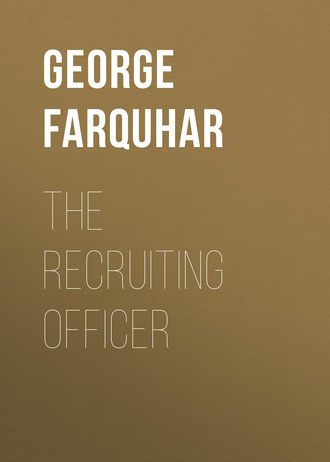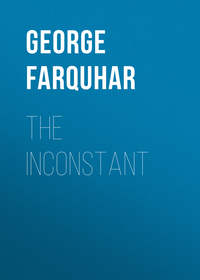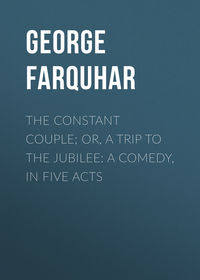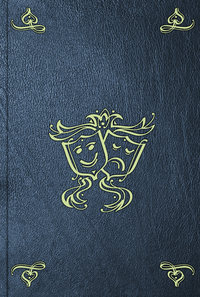 полная версия
полная версияThe Recruiting Officer
Mel. What do you mean, madam?
Syl. My meaning needs no interpretation, madam.
Mel. Better it had, madam; for methinks you are too plain.
Syl. If you mean the plainness of my person, I think your ladyship's as plain as me to the full.
Mel. Were I sure of that, I would be glad to take up with a rakehelly officer, as you do.
Syl. Again! lookye, madam, you are in your own house.
Mel. And if you had kept in yours, I should have excused you.
Syl. Don't be troubled, madam; I shan't desire to have my visit returned.
Mel. The sooner, therefore, you make an end of this, the better.
Syl. I am easily persuaded to follow my inclinations; and so, madam, your humble servant.
[Exit.Mel. Saucy thing!
Enter LucyLucy. What's the matter, madam?
Mel. Did not you see the proud nothing, how she swelled upon the arrival of her fellow?
Lucy. Her fellow has not been long enough arrived, to occasion any great swelling, madam; I don't believe she has seen him yet.
Mel. Nor shan't, if I can help it. – Let me see – I have it; bring me pen and ink – Hold, I'll go write in my closet.
Lucy. An answer to this letter, I hope, madam?
[Presents a Letter.Mel. Who sent it?
Lucy. Your captain, madam.
Mel. He's a fool, and I'm tired of him: send it back unopened.
Lucy. The messenger's gone, madam.
Mel. Then how should I send an answer? Call him back immediately, while I go write.
[Exeunt.ACT THE SECOND
SCENE I
An Apartment Enter Justice Balance and PlumeBal. Lookye, captain, give us but blood for our money, and you shan't want men. Ad's my life, captain, get us but another marshal of France, and I'll go myself for a soldier.
Plume. Pray, Mr. Balance, how does your fair daughter?
Bal. Ah, captain! what is my daughter to a marshal of France? we're upon a nobler subject; I want to have a particular description of the last battle.
Plume. The battle, sir, was a very pretty battle as any one should desire to see; but we were all so intent upon victory, that we never minded the battle: all that I know of the matter is, our general commanded us to beat the French, and we did so; and, if he pleases but to say the word, we'll do it again. But pray, sir, how does Mrs. Sylvia?
Bal. Still upon Sylvia! for shame, captain! you are engaged already – wedded to the war: victory is your mistress, and 'tis below a soldier to think of any other.
Plume. As a mistress, I confess – but as a friend, Mr. Balance —
Bal. Come, come, captain, never mince the matter; would not you seduce my daughter, if you could?
Plume. How, sir? I hope she is not to be seduced.
Bal. 'Faith, but she is, sir; and any woman in England of her age and complexion, by your youth and vigour. Lookye, captain, once I was young, and once an officer, as you are, and I can guess at your thoughts now by what mine were then; and I remember very well that I would have given one of my legs to have deluded the daughter of an old country gentleman like me, as I was then like you.
Plume. But, sir, was that country gentleman your friend and benefactor?
Bal. Not much of that.
Plume. There the comparison breaks: the favours, sir, that —
Bal. Pho, pho! I hate set speeches: if I have done you any service, captain, it was to please myself. I love thee, and if I could part with my girl, you should have her as soon as any young fellow I know; but I hope you have more honour than to quit the service, and she more prudence than to follow the camp: but she's at her own disposal; she has five thousand pounds in her pocket, and so – Sylvia, Sylvia!
[Calls. Enter SylviaSyl. There are some letters, sir, come by the post from London; I left them upon the table in your closet.
Bal. And here is a gentleman from Germany. – [Presents Plume to her.] Captain, you'll excuse me; I'll go read my letters, and wait on you.
[Exit.Syl. Sir, you are welcome to England.
Plume. You are indebted to me a welcome, madam, since the hopes of receiving it from this fair hand was the principal cause of my seeing England.
Syl. I have often heard that soldiers were sincere; may I venture to believe public report?
Plume. You may, when 'tis backed by private insurance; for I swear, madam, by the honour of my profession, that whatever dangers I went upon, it was with the hope of making myself more worthy of your esteem; and if ever I had thoughts of preserving my life, 'twas for the pleasure of dying at your feet.
Syl. Well, well, you shall die at my feet, or where you will; but you know, sir, there is a certain will and testament to be made beforehand.
Plume. My will, madam, is made already, and there it is; and if you please to open that parchment, which was drawn the evening before the battle of Hockstet, you will find whom I left my heir.
Syl. Mrs. Sylvia Balance. [Opens the Will, and reads.] Well, captain, this is a handsome and substantial compliment; but I can assure you I am much better pleased with the bare knowledge of your intention, than I should have been in the possession of your legacy: but, methinks, sir, you should have left something to your little boy at the Castle.
Plume. That's home. [Aside.] My little boy! lack-a-day, madam! that alone may convince you 'twas none of mine: why, the girl, madam, is my serjeant's wife, and so the poor creature gave out that I was the father, in hopes that my friends might support her in case of necessity. – That was all, madam – my boy! no, no, no!
Enter a ServantServ. Madam, my master has received some ill news from London, and desires to speak with you immediately; and he begs the captain's pardon, that he can't wait on him, as he promised.
Plume. Ill news! Heavens avert it! nothing could touch me nearer than to see that generous, worthy gentleman afflicted. I'll leave you to comfort him; and be assured that if my life and fortune can be any way serviceable to the father of my Sylvia, he shall freely command both.
Syl. The necessity must be very pressing that would engage me to endanger either.
[Exeunt severally.SCENE II
Another Apartment Enter Balance and SylviaSyl. Whilst there is life there is hope, sir; perhaps my brother may recover.
Bal. We have but little reason to expect it; the doctor acquaints me here, that before this comes to my hands he fears I shall have no son. – Poor Owen! but the decree is just; I was pleased with the death of my father, because he left me an estate; and now I am punished with the loss of an heir to inherit mine. I must now look upon you as the only hopes of my family; and I expect that the augmentation of your fortune will give you fresh thoughts and new prospects.
Syl. My desire in being punctual in my obedience, requires that you would be plain in your commands, sir.
Bal. The death of your brother makes you sole heiress to my estate, which you know is about three thousand pounds a year: this fortune gives you a fair claim to quality and a title: you must set a just value upon yourself, and, in plain terms, think no more of Captain Plume.
Syl. You have often commended the gentleman, sir.
Bal. And I do so still; he's a very pretty fellow; but though I liked him well enough for a bare son-in-law, I don't approve of him for an heir to my estate and family; five thousand pounds indeed I might trust in his hands, and it might do the young fellow a kindness; but – od's my life! three thousand pounds a year would ruin him, quite turn his brain – A captain of foot worth three thousand pounds a year! 'tis a prodigy in nature!
Enter a ServantServ. Sir, here's one with a letter below for your worship, but he will deliver it into no hands but your own.
Bal. Come, show me the messenger.
[Exit with Servant.Syl. Make the dispute between love and duty, and I am prince Prettyman exactly. – If my brother dies, ah, poor brother! if he lives, ah, poor sister! It is bad both ways, I'll try it again – Follow my own inclinations, and break my father's heart; or obey his commands, and break my own? Worse and worse. – Suppose I take it thus: A moderate fortune, a pretty fellow, and a pad; or a fine estate, a coach and six, and an ass. – That will never do neither.
Enter Balance and a ServantBal. Put four horses to the coach. [To a Servant, who goes out.] Ho, Sylvia!
Syl. Sir.
Bal. How old were you when your mother died?
Syl. So young that I don't remember I ever had one; and you have been so careful, so indulgent to me since, that indeed I never wanted one.
Bal. Have I ever denied you any thing you asked of me?
Syl. Never, that I remember.
Bal. Then, Sylvia, I must beg that once in your life you would grant me a favour.
Syl. Why should you question it, sir?
Bal. I don't; but I would rather counsel than command. I don't propose this with the authority of a parent, but as the advice of your friend, that you would take the coach this moment, and go into the country.
Syl. Does this advice, sir, proceed from the contents of the letter you received just now?
Bal. No matter; I will be with you in three or four days, and then give my reasons: but before you go, I expect you will make me one solemn promise.
Syl. Propose the thing, sir.
Bal. That you will never dispose of yourself to any man without my consent.
Syl. I promise.
Bal. Very well; and to be even with you, I promise I never will dispose of you without your own consent: and so, Sylvia, the coach is ready. Farewell. [Leads her to the Door, and returns.] Now, she's gone, I'll examine the contents of this letter a little nearer.
[Reads.Sir,
My intimacy with Mr. Worthy has drawn a secret from him, that he had from his friend Captain Plume; and my friendship and relation to your family oblige me to give you timely notice of it. The captain has dishonourable designs upon my cousin Sylvia. Evils of this nature are more easily prevented than amended; and that you would immediately send my cousin into the country, is the advice of,
Sir, your humble servant,Melinda.Why, the devil's in the young fellows of this age; they are ten times worse than they were in my time: had he made my daughter a whore, and forswore it, like a gentleman, I could almost have pardoned it; but to tell tales beforehand is monstrous. – Hang it! I can fetch down a woodcock or a snipe, and why not a hat and cockade? I have a case of good pistols, and have a good mind to try.
Enter WorthyWorthy, your servant.
Wor. I'm sorry, sir, to be the messenger of ill news.
Bal. I apprehend it, sir; you have heard that my son Owen is past recovery.
Wor. My letters say he's dead, sir.
Bal. He's happy, and I am satisfied: the stroke of Heaven I can bear; but injuries from men, Mr. Worthy, are not so easily supported.
Wor. I hope, sir, you are under no apprehensions of wrong from any body.
Bal. You know I ought to be.
Wor. You wrong my honour, in believing I could know any thing to your prejudice, without resenting it as much as you should.
Bal. This letter, sir, which I tear in pieces, to conceal the person that sent it, informs me that Plume has a design upon Sylvia, and that you are privy to it.
Wor. Nay, then, sir, I must do myself justice, and endeavour to find out the author. [Takes up a Bit.] – Sir, I know the hand, and if you refuse to discover the contents, Melinda shall tell me.
[Going.Bal. Hold, sir; the contents I have told you already; only with this circumstance – that her intimacy with Mr. Worthy had drawn the secret from him.
Wor. Her intimacy with me! Dear sir! let me pick up the pieces of this letter, 'twill give me such a power over her pride to have her own an intimacy under her hand. – This was the luckiest accident! [Gathering up the Letter.] The aspersion, sir, was nothing but malice; the effect of a little quarrel between her and Mrs. Sylvia.
Bal. Are you sure of that, sir?
Wor. Her maid gave me the history of part of the battle just now, as she overheard it: but I hope, sir, your daughter has suffered nothing upon the account.
Bal. No, no, poor girl! she's so afflicted with the news of her brother's death, that, to avoid company, she begged leave to go into the country.
Wor. And is she gone?
Bal. I could not refuse her, she was so pressing; the coach went from the door the minute before you came.
Wor. So pressing to be gone, sir? – I find her fortune will give her the same airs with Melinda, and then Plume and I may laugh at one another.
Bal. Like enough; women are as subject to pride as men are; and why mayn't great women as well as great men forget their old acquaintance? But come, where's this young fellow? I love him so well, it would break the heart of me to think him a rascal. – I am glad my daughter's gone fairly off though. – [Aside.] Where does the captain quarter?
Wor. At Horton's; I am to meet him there two hours hence, and we should be glad of your company.
Bal. Your pardon, dear Worthy! I must allow a day or two to the death of my son. The decorum of mourning is what we owe the world, because they pay it to us; afterwards I'm yours over a bottle, or how you will.
Wor. Sir, I'm your humble servant.
[Exeunt apart.SCENE III
The Street Enter Kite, with Costar Pearmain in one Hand, and Thomas Appletree in the other, drunkKite singsOur 'prentice Tom may now refuseTo wipe his scoundrel master's shoes,For now he's free to sing and playOver the hills and far away.Over, &c.[The Mob sing the ChorusWe shall lead more happy livesBy getting rid of brats and wives,That scold and brawl both night and day,Over the hills and far away.Over, &c.Kite. Hey, boys! thus we soldiers live! drink, sing, dance, play; – we live, as one should say – we live – 'tis impossible to tell how we live – we are all princes – why, why you are a king – you are an emperor, and I'm a prince – now, an't we?
Tho. No serjeant, I'll be no emperor.
Kite. No!
Tho. I'll be a justice of peace.
Kite. A justice of peace, man!
Tho. Ay, wauns will I; for since this pressing act, they are greater than any emperor under the sun.
Kite. Done; you are a justice of peace, and you are a king, and I am a duke, and a rum duke, an't I?
Cost. I'll be a queen.
Kite. A queen.
Cost. Ay, of England, that's greater than any king of them all.
Kite. Bravely said, 'faith! huzza for the queen. [Huzza.] But harkye, you Mr. Justice, and you Mr. Queen, did you ever see the king's picture?
Both. No! no! no!
Kite. I wonder at that; I have two of them set in gold, and as like his majesty, God bless the mark! see here, they are set in gold.
[Takes two broad pieces out of his pocket; presents one to each.Tho. The wonderful works of nature! [Looking at it.
What's this written about? here's a posy, I believe. – Ca-ro-lus! – what's that, serjeant?
Kite. O! Carolus! why, Carolus is Latin for King George; that's all.
Cost. Tis a fine thing to be a scollard. – Serjeant, will you part with this? I'll buy it on you, if it come within the compass of a crown.
Kite. A crown! never talk of buying; 'tis the same thing among friends, you know; I'll present them to ye both: you shall give me as good a thing. Put them up, and remember your old friend when I am over the hills and far away.
[They sing, and put up the Money. Enter Plume, singingOver the hills and over the main,To Flanders, Portugal, or Spain;The king commands and we'll obey,Over the hills and far away.Come on my men of mirth, away with it; I'll make one among ye. Who are these hearty lads?
Kite. Off with your hats; 'ounds! off with your hats: this is the captain, the captain.
Tho. We have seen captains afore now, mun.
Cost. Ay, and lieutenant-captains too. 'Sflesh! I'll keep on my nab.
Tho. And I'se scarcely d'off mine for any captain in England. My vether's a freeholder.
Plume. Who are those jolly lads, serjeant?
Kite. A couple of honest brave fellows that are willing to serve the king: I have entertained them just now as volunteers, under your honour's command.
Plume. And good entertainment they shall have: volunteers are the men I want; those are the men fit to make soldiers, captains, generals.
Cost. Wounds, Tummas, what's this! are you listed?
Tho. Flesh! not I: are you, Costar?
Cost. Wounds! not I.
Kite. What! not listed? ha! ha! ha! a very good jest, i'faith.
Cost. Come, Tummus, we'll go home.
Tho. Ay, ay, come.
Kite. Home! for shame, gentlemen; behave yourselves better before your captain. Dear Tummas, honest Costar!
Tho. No, no! we'll be gone.
Kite. Nay, then, I command you to stay: I place you both centinels in this place for two hours, to watch the motion of St. Mary's clock you, and you the motion of St. Chad's; and he, that dares stir from his post till he be relieved, shall have my sword in his guts the next minute.
Plume. What's the matter, serjeant? I'm afraid you are too rough with these gentlemen.
Kite. I'm too mild, sir; they disobey command, sir; and one of them should be shot, for an example to the other.
Cost. Shot! Tummas?
Plume. Come, gentlemen, what's the matter?
Tho. We don't know; the noble serjeant is pleas'd to be in a passion, sir; but —
Kite. They disobey command; they deny their being listed.
Tho. Nay, serjeant, we don't downright deny it, neither; that we dare not do, for fear of being shot; but we humbly conceive, in a civil way, and begging your worship's pardon, that we may go home.
Plume. That's easily known. Have either of you received any of the king's money?
Cost. Not a brass farthing, sir.
Kite. They have each of them received one-and-twenty shillings, and 'tis now in their pockets.
Cost. Wounds! if I have a penny in my pocket but a bent sixpence, I'll be content to be listed and shot into the bargain.
Tho. And I: look ye here, sir.
Cost. Nothing but the king's picture, that the serjeant gave me just now.
Kite. See there, a guinea, one and twenty shillings; t'other has the fellow on't.
Plume. The case is plain, gentlemen: the goods are found upon you: those pieces of gold are worth one-and-twenty shillings each.
Cost. So it seems that Carolus is one-and-twenty shillings in Latin.
Tho. 'Tis the same thing in Greek, for we are listed.
Cost. Flesh; but we an't, Tummus: I desire to be carried before the mayor, captain.
[Captain and Serjeant whisper the while.Plume. 'Twill never do, Kite – your damned tricks will ruin me at last – I won't lose the fellows, though, if I can help it. – Well, gentlemen, there must be some trick in this; my serjeant offers to take his oath that you are fairly listed.
Tho. Why, captain, we know that you soldiers have more liberty of conscience than other folks; but for me or neighbour Costar here to take such an oath, 'twould be downright perjuration.
Plume. Lookye, rascal, you villain! If I find that you have imposed upon these two honest fellows, I'll trample you to death, you dog – Come, how was't?
Tho. Nay, then we'll speak. Your serjeant, as you say, is a rogue, an't like your worship, begging your worship's pardon – and —
Cost. Nay, Tummus, let me speak, you know I can read. – And so, sir, he gave us those two pieces of money for pictures of the king, by way of a present.
Plume. How? by way of a present! the son of a whore! I'll teach him to abuse honest fellows like you! – scoundrel! rogue! villain!
[Beats off the Serjeant, and follows.Both. O brave noble captain! huzza! A brave captain, 'faith!
Cost. Now, Tummas, Carolus is Latin for a beating. This is the bravest captain I ever saw – Wounds! I've a month's mind to go with him.
Enter PlumePlume. A dog, to abuse two such honest fellows as you. – Lookye, gentlemen, I love a pretty fellow; I come among you as an officer to list soldiers, not as a kidnapper to steal slaves.
Cost. Mind that, Tummas.
Plume. I desire no man to go with me but as I went myself; I went a volunteer, as you or you may do; for a little time carried a musket, and now I command a company.
Tho. Mind that, Costar. A sweet gentleman!
Plume. Tis true, gentlemen, I might take an advantage of you; the king's money was in your pockets – my serjeant was ready to take his oath you were listed; but I scorn to do a base thing; you are both of you at your liberty.
Cost. Thank you, noble captain – Icod! I can't find in my heart to leave him, he talks so finely.
Tho. Ay, Costar, would he always hold in this mind.
Plume. Come, my lads, one thing more I'll tell you: you're both young tight fellows, and the army is the place to make you men for ever: every man has his lot, and you have yours: what think you of a purse of French gold out of a monsieur's pocket, after you have dashed out his brains with the but end of your firelock, eh?
Cost. Wauns! I'll have it. Captain – give me a shilling; I'll follow you to the end of the world.
Tho. Nay, dear Costar! do'na: be advis'd.
Plume. Here, my hero, here are two guineas for thee, as earnest of what I'll do farther for thee.
Tho. Do'na take it; do'na, dear Costar.
[Cries, and pulls back his Arm.Cost. I wull – I wull – Waunds! my mind gives me that I shall be a captain myself – I take your money, sir, and now I am a gentleman.
Plume. Give me thy hand; and now you and I will travel the world o'er, and command it wherever we tread. – Bring your friend with you, if you can. [Aside.
Cost. Well, Tummas, must we part?
Tho. No, Costar, I cannot leave thee. – Come, captain, I'll e'en go along too; and if you have two honester simpler lads in your company than we two have been, I'll say no more.
Plume. Here, my lad. [Gives him Money.] Now, your name?
Tho. Tummas Appletree.
Plume. And yours?
Cost. Costar Pearmain.
Plume. Well said, Costar! Born where?
Tho. Both in Herefordshire.
Plume. Very well. Courage, my lads. Now we'll
Sings.
Over the hills, and far away.Courage, boys, it's one to tenBut we return all gentlemen;While conq'ring colours we display,Over the hills, and far away.Kite, take care of them.
Enter KiteKite. An't you a couple of pretty fellows, now! Here, you have complained to the captain; I am to be turned out, and one of you will be serjeant. Which of you is to have my halberd?
Both Rec. I.
Kite. So you shall – in your guts. – March, you sons of whores!





